Edward Feser's Blog, page 53
September 9, 2018
The latest on Five Proofs
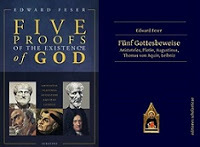 Some months back I was interviewed by Doug Keck of
EWTN Bookmark
about my book
Five Proofs of the Existence of God
. The episode airs today on EWTN, and you can also watch it online either at the show’s website or at YouTube. The book has been reviewed in The Times Literary Supplement by atheist philosopher Simon Blackburn, who remains unconvinced. “In spite of Feser’s admirable industry,” he writes, “the whole enterprise does little more than suggest Kant’s description of a dazzling and deceptive illusion.” I have a response to Blackburn forthcoming in TLS.
Some months back I was interviewed by Doug Keck of
EWTN Bookmark
about my book
Five Proofs of the Existence of God
. The episode airs today on EWTN, and you can also watch it online either at the show’s website or at YouTube. The book has been reviewed in The Times Literary Supplement by atheist philosopher Simon Blackburn, who remains unconvinced. “In spite of Feser’s admirable industry,” he writes, “the whole enterprise does little more than suggest Kant’s description of a dazzling and deceptive illusion.” I have a response to Blackburn forthcoming in TLS. Five Proofs is also now available in a German translation as Fünf Gottesbeweise , from Editiones Scholasticae.
Published on September 09, 2018 09:48
September 5, 2018
Why Archbishop Viganò is almost certainly telling the truth
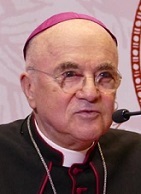 There are five considerations that seem to me to make it very likely that Archbishop Viganò’s testimony is truthful. To be sure, given how numerous and detailed are the claims he makes, it would not be surprising if he has gotten certain particulars wrong. And perhaps in his passion he has inadvertently overstated things here and there. But the main claims are probably true. I certainly do not believe he is lying. The reasons are these: 1. The deafening silence of Pope Francis
There are five considerations that seem to me to make it very likely that Archbishop Viganò’s testimony is truthful. To be sure, given how numerous and detailed are the claims he makes, it would not be surprising if he has gotten certain particulars wrong. And perhaps in his passion he has inadvertently overstated things here and there. But the main claims are probably true. I certainly do not believe he is lying. The reasons are these: 1. The deafening silence of Pope Francis Pope Francis has been accused of grave offenses by a churchman of high stature who was in an optimal position to know about the matters in question. Yet he has refused to deny the charges or to comment on the matter at all. That is simply not the way one would expect a person to act if such charges against him were false. You would expect him immediately, clearly, and vigorously to deny the charges.
Some of his defenders suggest that the pope is merely exhibiting a Christ-like lack of concern for his own reputation. He is not defending himself, so the claim goes, any more than Christ defended himself against those who crucified him. Yet the pope has defended himself in other contexts. For example, he has defended himself against the accusation that he is a communist and against charges that he failed to speak out forcefully enough during Argentina’s “dirty war.” After he was criticized by some on the Left for meeting with Kim Davis in 2015, the Vatican issued a statement asserting that “his meeting with her should not be considered a form of support of her position in all of its particular and complex aspects.” In 2016, the pope defended himself against criticism of his refusal to associate Islam with violence. In 2017, he defended himself against criticism of his comparison of migrant camps to concentration camps.
So, the thesis that the pope prefers to “turn the other cheek” rather than answer critics simply doesn’t withstand scrutiny. He does answer them, sometimes. Why, then, would he not defend himself against the far more serious charges now at issue, leveled by an accuser far more eminent than some of the critics the pope has answered in the past?
Furthermore, it is not merely the pope’s own reputation that is at stake. The good of the Church is at stake. There is, as people on both sides of the controversy have noted, a kind of “civil war” brewing in the Church. The pope could help prevent that if he would only respond to the archbishop’s charges. Yet he has not done so.
Pope Francis’s defenders demand that the archbishop back up his charges with evidence. But the archbishop has told us where the evidence is. For example, he has told us that relevant documentation can be found in the files of the Secretariat of State at the Vatican and at the Apostolic Nunciature in Washington.
Now, the pope himself has more power than anyone else does to make sure that this evidence is released. He could order Vatican officials to release whatever relevant documents they have, and order local church officials to do the same. And if that evidence would exonerate him, you would think that this is exactly what he would do. Yet he has not done so.
Moreover, at least some of Archbishop Viganò’s charges have to do with private conversations he says he had with Pope Francis. The archbishop’s own testimony about these conversations is evidence. If we want further evidence, only Pope Francis can give it, in the form of his own testimony about the conversations. Yet he refuses to comment.
Again, this is not the way one would expect someone to act against whom false charges have been made – which supports the conclusion that the charges are not false.
2. The apparent silence of Pope Benedict
Pope Emeritus Benedict XVI has not commented on any of the doctrinal controversies of the past five years, even though he must surely disapprove of some of what Pope Francis is widely claimed to have taught. For example, though Benedict has made it clear enough that he does not agree with the policy of admitting couples in invalid marriages to Holy Communion, he has remained silent about the controversy over Amoris Laetitia. The best explanation is that Benedict does not want to say anything that might inadvertently promote schism. Better in his view, apparently, to leave doctrinal confusion to be sorted out by a future pope than to split the Church apart.
Now, the current controversy is itself something that threatens to split the Church apart. Since Benedict seems to fear that outcome most of all, you would expect him to act in a way that is in his judgment most likely to prevent it.
So, suppose Archbishop Viganò is lying about the sanctions he claims Benedict imposed privately on Cardinal McCarrick. Then Benedict could correct the record and more or less end the current crisis. He wouldn’t even have to accuse the archbishop of lying. He could phrase his remarks in a way that simply asserts that what Viganò is saying is mistaken. Viganò’s credibility would be severely damaged, his defenders would have the wind taken out of their sails, and Pope Francis’s credibility would be largely restored at least in many people’s minds. In other words, the threat of schism would be greatly reduced.
But suppose Archbishop Viganò is telling the truth. Then, if Benedict publicly confirms this, he will vindicate the archbishop’s credibility and thereby do grave damage to Pope Francis. Indeed, such an act would be perceived by many as intended to damage Pope Francis. This would certainly greatly increase the possibility of schism, since many Catholics would see this as a war of popes – some rallying behind Benedict, others behind Francis. The very idea must be horrifying to Benedict, and rightly so.
So, if Benedict is worried about schism, then his silence seems much more comprehensible on the hypothesis that Viganò is telling the truth than it is on the hypothesis that what Viganò is saying is false.
Now, it may be that Benedict has tried to comment in a subtle and indirect way on the controversy. In a summary of developments since the release of Viganò’s testimony, Catholic News Agency notes that “a source close to Benedict” told reporter Edward Pentin that “as far as the former pope could remember” he had made a “private request” that McCarrick keep a “low profile,” where this differs from a “formal decree.”
If this communication was made at Benedict’s behest – and we don’t know that for sure – then this might be interpreted as the former pope’s way of finessing the difficulty of having to choose between either confirming Viganò’s testimony and thereby hurting Pope Francis, or undermining that testimony and thereby hurting Viganò. For on the one hand, the insinuation that Benedict does not clearly remember what happened but that in any case there was no formal decree seems to help Pope Francis. But on the other hand, the assertion that there was a private request to McCarrick that he keep a low profile confirms the gist of Viganò’s allegation.
Some of Pope Francis’s defenders are spinning Pentin’s report as if it undermined Viganò, but it does not do so. Viganò never said there was a formal decree against McCarrick in the sense of the imposition of sanctions as the outcome the standard formal investigative process. His whole point was that the action against McCarrick was something done privately by Pope Benedict rather than a matter of following ordinary disciplinary proceedings. As some commentators have pointed out, this would be similar to the way Benedict dealt with the disgraced Fr. Marcial Maciel.
Some have also claimed that the fact that McCarrick carried out some public actions in the years after Benedict’s alleged imposition of sanctions undermines Viganò’s story. Again, that is not the case. As Rod Dreher points out, the answer to this is that “McCarrick defied the pope’s order. One main theme of the Viganò statement is that these curial cardinals and their allies (Wuerl, McCarrick, et al.) are laws unto themselves.”
The bottom line is that Pentin’s source confirms that Benedict did take private action against McCarrick, just as Viganò said. So, either Pope Benedict has in this indirect and subtle way confirmed part of Viganò’s story, or (if the communication to Pentin was not made at the former pope’s behest) he has remained entirely silent on the controversy, which for the reasons I have given is more comprehensible on the supposition that Viganò is telling the truth. Either way, Benedict’s actions support the truth of Viganò’s testimony.
3. Archbishop Viganò’s concern for his own place in history and his immortal soul
Archbishop Viganò has very conservative theological views. Indeed, his critics insist on emphasizing this point, since they accuse him of having a grudge against a pope widely perceived to be theologically liberal.
Now, among the things any Catholic with very conservative theological views would believe is the Church’s traditional teaching that lying is always and intrinsically sinful, even when done for a good cause – and that it is always mortally sinful when the lie concerns a serious matter, such as another person’s reputation.
Another thing that Catholics with very conservative theological views believe is that while popes are fallible when not speaking ex cathedra, they ought always to be treated with great reverence, even when they are in error. A bad pope is not like the leader of some political faction with which one disagrees. Rather, he is like an errant father. He does not cease to be your father even when he does something bad, and his bad behavior gives no license for treating him with contempt. Even though he may under certain circumstances be criticized by his subordinates, this must be done only with caution and respect, the way a son might plead with his father to reconsider some unwise policy or to cease some abusive behavior.
A third thing that is true of Catholics with conservative theological beliefs is that they tend to have a very romantic view of Church history, and a supernatural one. They see it as an epic story of great saints who obey the divine law even at the cost of their own lives but who are always vindicated in the end; of evildoers who, however seemingly invincible, are always ultimately exposed and undone; and of the divine providence that guarantees these outcomes even when, humanly speaking, all seems lost.
They do not see Church history as fundamentally driven by grubby power politics. They do not see the saints as cynical and clever manipulators who get the edge over their opponents by ruthless means. No Catholic with traditional theological views looks back at the days of Pope Honorius, the Western Schism, or the Borgia popes and thinks: “If only I had been there, I would have come up with a very clever lie that would have saved the day!” Any traditionally-minded Catholic would see this as blasphemous presumption – the doing of evil for the sake of a good end, as if God were incapable of saving his Church in any other way.
Now, suppose Archbishop Viganò were lying. Then he would be committing what he knows to be a mortal sin, because he would be slandering no less than the Vicar of Christ. And he would be committing new mortal sins every time he reiterates these charges, as he has done in the days since he first released his testimony. Nor, as he would know, would sacramental confession wipe away his guilt under these circumstances, because if he were committed to a policy of persisting in this lie, he would lack the firm purpose of amendment that is a condition of being absolved.
If the archbishop were lying, he would also be guilty of contempt for the Vicar of Christ himself, and comparable to a son who humiliates his father and treats him the way he would treat a political enemy. And the archbishop would also be putting himself at grave risk of being remembered as one of the great villains of Church history – a Judas-like figure who slandered a pope and divided the Church. Even worse, he would be putting his immortal soul at grave risk of eternal damnation.
Secular readers and liberal Catholics might think this all very quaint and melodramatic. But the point is that this is the way a traditionally-minded Catholic would see things. In particular, it is the way Archbishop Viganò must see things, given that – as his critics themselves keep insisting – he has what they consider reactionary theological opinions.
Note that it is no good to respond by pointing out (as some have) that the archbishop once said some nice things about McCarrick at a public event, as if this were evidence that he is a liar. Viganò is a diplomat, and the job of a diplomat is to be diplomatic. Everybody knows that at public events, speakers will often say complimentary things about others in the room whether or not they really mean them, as a matter of politeness. This falls under the category of what moral theologians call a “broad mental reservation” rather than a lie, because the nature of the speech act is such that the ordinary listener is well aware that in such a context the speaker might just be being polite and not intending to speak the literal truth.
The archbishop’s testimony is not like that at all, because what he is doing in that context is precisely claiming to reveal literal truths. If what he is saying there is not true, it would be a lie and not a mere mental reservation.
But, again, to believe that the archbishop is lying in his testimony is to believe that he would be willing to do something that, by his own lights, would risk eternal damnation and perpetual infamy – all because he is irked about the Kim Davis affair or other relatively trivial matters. That is simply not plausible. The theological conservatism Viganò’s critics insist on emphasizing in fact makes it less likely that he would lie, not more likely.
4. Pope Francis’s record
As Sandro Magister, Fr. Dwight Longenecker, and others have noted, rehabilitating Cardinal McCarrick would in fact not be all that surprising given Pope Francis’s record. For example, Cardinal Godfried Danneels notoriously tried to protect a pedophile bishop from being exposed. As Pentin notes, Danneels also:
advised the king of Belgium to sign an abortion law in 1990… and refused to forbid pornographic, “educational” materials being used in Belgian Catholic schools. He also once said same-sex “marriage” was a “positive development” and congratulated the Belgian government for passing same-sex “marriage” legislation, although he has sought to distinguish such a union from the Church’s understanding of marriage.
End quote. Yet Danneels was invited by Pope Francis to appear on the balcony with him when his election was announced, and the pope appointed Danneels to a key position at the 2015 Synod on the Family.
Former Los Angeles archbishop Cardinal Roger Mahony was, in 2013, disciplined by his successor for his mishandling of clergy sexual abuse cases in the archdiocese. But earlier this year, Pope Francis appointed Mahony as a special envoy – though Mahony eventually withdrew in the wake of protests from the laity.
Then there is the case of Fr. Mauro Inzoli. As Michael Brendan Dougherty reported last year in The Week:
Inzoli… [was] accused of molesting children. He allegedly abused minors in the confessional. He even went so far as to teach children that sexual contact with him was legitimated by scripture and their faith. When his case reached CDF, he was found guilty. And in 2012, under the papacy of Pope Benedict, Inzoli was defrocked.
But [Inzoli] was "with cardinal friends," we have learned. Cardinal Coccopalmerio and Monsignor Pio Vito Pinto, now dean of the Roman Rota, both intervened on behalf of Inzoli, and Pope Francis returned him to the priestly state in 2014, inviting him to a “a life of humility and prayer.” These strictures seem not to have troubled Inzoli too much. In January 2015, [he] participated in a conference on the family in Lombardy.
This summer, civil authorities finished their own trial of Inzoli, convicting him of eight offenses. Another 15 lay beyond the statute of limitations. The Italian press hammered the Vatican, specifically the CDF, for not sharing the information they had found in their canonical trial with civil authorities. Of course, the pope himself could have allowed the CDF to share this information with civil authorities if he so desired.
End quote. Another case: Msgr. Battista Ricca, The Telegraphreports, “had a string of homosexual affairs that forced his recall from an overseas posting.” But, as Fr. Longenecker comments, even after the exposure of this history, Ricca “still works in the Vatican running the St Martha Hostel where the Pope lives and (as far as I can ascertain) still works at the Vatican Bank.”
Especially controversial was Pope Francis’s handling of the case of Chilean Bishop Juan Barros, who is accused of covering up the sexual abuse of Fr. Fernando Karadima. Fr. Raymond de Souza’s account of the affair is worth quoting at length:
Barros… was promoted from being the military bishop to the Diocese of Osorno in 2015. Protests against this were voluble, and his installation Mass had to be cut short due to violent demonstrators in the cathedral. Most of his priests boycotted his arrival, and the rest of the members of the Chilean episcopate kept their distance.
Pope Francis, though, was determined to make a stand for Bishop Barros’ innocence. In 2015, in St. Peter’s Square, he accused the critics of the bishop of being politically manipulated by “leftists.” That episode – the haranguing Pope captured on video – is played constantly in Chile as an example of the Holy Father’s protection of Bishop Barros and his disdain for the concerns of victims…
The papal nuncio had arranged to have Bishop Barros resign; instead, the Pope confirmed his appointment and insisted upon it even in the face of the Chilean bishops’ vehement protest… [I]n the most disastrous press interview of his pontificate, Pope Francis told journalists in Chile that those who said Bishop Barros was guilty of a cover-up were guilty of “calumny.”
After that, not only did the Pope have no allies in the Chilean episcopate, but Cardinal Sean O’Malley of Boston, a member of the papal-picked “Council of Cardinals” and head of the Papal Commission on the Sexual Abuse of Minors, took the astonishing step of publicly rebuking the Holy Father, saying that his words caused “great pain” for sexual-abuse victims. The rebuke by Cardinal O’Malley was unprecedented, all the more shocking given that he is considered a close papal ally.
Chastened, and knowing that in a public quarrel with Cardinal O’Malley his own credibility would be shredded, Pope Francis accepted the rebuke during the news conference on the plane home, saying that the cardinal’s statement was just.
End quote. One can only speculate about why the pope has taken such a lenient attitude toward the priests and prelates in question. One possibility is that he takes such a policy to follow from his well-known emphasis on mercy over law and justice. Another is that he regards the churchmen in question as theologically sympathetic allies, and is for that reason willing to overlook their actions. Whatever the reason, a rehabilitation of McCarrick, including a canceling out of whatever penalties were imposed privately by Pope Benedict, would not be surprising given this history.
Pope Francis’s response to other criticism he has received over the last few years is also relevant to the current controversy. He has repeatedly refused to respond even to respectful pleas from eminent churchmen and theologians to clarify his sometimes doctrinally ambiguous statements, even though a clarification would instantly defuse criticism. For example, in response to the controversy over the implications of Amoris Laetitia, the pope could easily say: “Of course it is always wrong for a couple who are not in a valid marriage to engage in sexual relations. In no way is Amoris meant to deny that.” Yet he has refused to do so.
In short, Pope Francis is not known for “straight talk” or straightforward speech. Archbishop Viganò, by contrast, makes claims in his testimony that are extremely clear and frank. He also tells us where to find confirming evidence. He has thereby opened his assertions up to refutation (if they are false), rather than being vague and evasive. Now, apriori, the credibility of someone who makes clear and testable claims is greater than that of someone who is habitually ambiguous and evasive.
5. The response of Viganò’s critics
The New York Times reports that though Cardinals Wuerl and Tobin have denied they knew about the sanctions on McCarrick alleged by Viganò, the general tendency among those named by Viganò in his testimony has been to refuse to respond:
Following the pope’s lead, the Vatican has gone on lockdown.
Cardinal Leonardo Sandri, whom Archbishop Viganò also accused in the letter of covering up sexual misconduct by Cardinal McCarrick, rushed a reporter off the phone on Thursday evening.
“Look, I’m not in my office. Good evening. Good evening,” he said. And he was the most talkative.
The Times reached out to every cardinal and bishop said by Archbishop Viganò to have known about the alleged sanctions on Cardinal McCarrick by Benedict. More than a dozen of them declined or did not answer requests for comment…
A visit to the Vatican Embassy in Washington yielded no information.
End quote. Like the pope’s silence, this is odd. You would expect people innocent of charges of the gravity of those leveled by Viganò immediately, clearly, and vigorously to deny them. Of course, a guilty person might also deny charges raised against him. In his testimony, Viganò is particularly hard on Wuerl, whom he says “lies shamelessly.” But the point isn’t that people who deny charges made against them are always innocent. The point is that people who are innocent usually deny charges made against them.
You would also expect the pope’s most vigorous defenders loudly to be calling for the Vatican and the Apostolic Nunciature in Washington to release of all the documentation cited by Viganò, since the best way to discredit him would be to show that that documentation does not support his charges. But the defenders mostly don’t seem terribly interested in that.
What they do seem interested in is hammering on Viganò’s theological conservatism and his relationships to conservative Catholic media, as if this casts serious doubt on his credibility – in other words, the classic ad hominem fallacy of “poisoning the well.” The charges are either true or false, and Viganò’s motivations for making them are irrelevant to that.
That this attempt at “well-poisoning” is fallacious is only one problem with it. A second problem, as I have already noted, is that Viganò’s theological conservatism in fact makes it less likely that he would be lying, not more likely. A third problem is that the ad hominem tactic cuts both ways. Viganò’s critics can, with no less justice, be accused of wanting to smear him because they have a theologically liberal agenda that they fear will be threatened if Pope Francis is weakened or led to resign.
As the old lawyer’s saw has it, when the facts and law are on your side, you pound those; and when they aren’t, you pound the table instead. Viganò’s critics, who are now pounding the table so loudly while showing a strange disinterest in the facts (namely the documents Viganò has told us to look at), rather give the impression that they too believe that those facts are not on their side.
* * *
Of course, for all I have said, it is possible that new evidence might emerge that disproves Viganò’s key claims. More plausibly, it might turn out that though Viganò is not lying, he has gotten certain details wrong, or that his evident passion has led him inadvertently to exaggerate this or that claim or to overstate his case here or there.
Still, as things stand now, it seems very unlikely that he is lying, or that the broad outlines of his testimony are false. The best way to make progress in determining where the truth lies is for the relevant documents to be released and for the key figures named by Viganò to respond to his charges. The pope could order the release of the documents, and respond to Viganò’s charges directly and urge the others to do the same. The ball is in his court.
Related posts:
Papal fallibility
Denial flows into the Tiber
The Church permits criticism of popes under certain circumstances
Hubris meets nemesis?
Published on September 05, 2018 20:12
September 2, 2018
Five Proofs on The Ben Shapiro Show
 Recently I was interviewed by Ben Shapiro for an episode of The Ben Shapiro Show Sunday Special. The subject is my recent book
Five Proofs of the Existence of God
. You can watch the interview either at YouTube or at the show’s website at The Daily Wire. Earlier interviews can be found at my main website.
Recently I was interviewed by Ben Shapiro for an episode of The Ben Shapiro Show Sunday Special. The subject is my recent book
Five Proofs of the Existence of God
. You can watch the interview either at YouTube or at the show’s website at The Daily Wire. Earlier interviews can be found at my main website.
Published on September 02, 2018 09:14
August 31, 2018
Finnis contra Francis
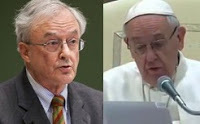 Prof. John Finnis is the most eminent living “new natural law” theorist, and a longtime opponent of capital punishment. Indeed, like other NNL writers, he regards capital punishment as always and inherently wrong, and believes that the Church could adopt this novel teaching. You might think, then, that he would approve of Pope Francis’s recent revision to the catechism. Not so. In a recent article at Public Discourse, which is mostly devoted to defending the possibility of a change in teaching, Finnis makes some critical remarks about the recent revision. Finnis believes that the revision did not in fact change Catholic teaching, though he thinks it did “create at least an impression of change.” But he also thinks that it does so “in a form that obscures the one line of development that would, it seems, be authentic.” In other words, though Finnis thinks the Church could change its traditional teaching, even he believes that the specific way that the revised language suggests such a change is not an “authentic” development of doctrine.
Prof. John Finnis is the most eminent living “new natural law” theorist, and a longtime opponent of capital punishment. Indeed, like other NNL writers, he regards capital punishment as always and inherently wrong, and believes that the Church could adopt this novel teaching. You might think, then, that he would approve of Pope Francis’s recent revision to the catechism. Not so. In a recent article at Public Discourse, which is mostly devoted to defending the possibility of a change in teaching, Finnis makes some critical remarks about the recent revision. Finnis believes that the revision did not in fact change Catholic teaching, though he thinks it did “create at least an impression of change.” But he also thinks that it does so “in a form that obscures the one line of development that would, it seems, be authentic.” In other words, though Finnis thinks the Church could change its traditional teaching, even he believes that the specific way that the revised language suggests such a change is not an “authentic” development of doctrine. About Pope Francis’s address of October 11, 2017, wherein the pope first proposed a change to the catechism, Finnis has some harsh words:
[T]hat address is replete with untethered calls for doctrinal progress, and with assurances about consistency with “past teaching” that all ring hollow, offering quasi-arguments that seem at best question-begging and more likely just incoherent and unserious. Behind such arguments, moreover, there becomes more and more evident an intent to smother key elements of the Church’s most constant and apostolic understanding of its moral teachings, elements reaffirmed most weightily only twenty-five years ago in Veritatis Splendor.
Thus [among] the main effects of the revision, given its ambiguities and, strictly speaking, unfruitfulness in doctrinal substance, seem likely to be [that]… widely felt uncertainties about the Church’s seaworthiness in faith and integrity of life will be exacerbated.
End quote. One of Finnis’s objections to the revision, and to the CDF cover letter that announced it, concerns their “unwarrantable confidence” in certain empirical claims about what is sufficient in order to defend society. Another and more important objection is that the documents put too much emphasis on human dignity and too little on “God’s absolute lordship over life and death.” And that they do so in a way that seems to reflect secular rather than Catholic thinking. Finnis writes:
By focusing all but exclusively on human dignity… this pair of documents arouses or reinforces, yet again, a serious misgiving. Is Christ’s Church coming to heel behind atheist or pantheist secular globalist powers, and agendas, that it would do well to desist from flattering? Does the adoption of these new formulations, silent about the teaching’s true sources (reverence for life, purity of intention, and divine lordship), prejudice the Church’s own dignity and authority and, worse, the integrity of its doctrine and life?
For we should be under no illusions: the organs of the European Council, the United Nations, and the European Union, unconcerned to exclude from human society all intent to kill, and disdainful of God’s lordship over life and death, are devoted to the opaque language of dignity. They deploy it constantly, bureaucratically, to promote their rejection of capital punishment but equally their indulgence towards euthanasia, suicide, and the many forms of anti-marital sex, and the radically unjust promotion of gender fluidity and same-sex parodies of marriage. And the educational institutions and programs they promote are nearly unanimous in denying or ignoring the justice of retribution, with its attention to the continuing and often justly decisive relevance of past deeds to present entitlement and conduct, attention and relevance essential to the truth of the Christian faith.
End quote. When your apparent change to the Church’s teaching on capital punishment manages to outrage even those who have long wanted to change the Church’s teaching on capital punishment, you’ve got a problem.
Finnis, with the late Germain Grisez, authored an appeal to Pope Francis to correct doctrinal errors that Amoris Laetitia appears to encourage. Like all the other sober, respectful, and scholarly petitions that have been directed toward the pope over the last few years, it has been completely ignored by him.
I will have more to say about Finnis’s article in a forthcoming article of my own, which responds to the things Finnis says in criticism of my own views.
Published on August 31, 2018 09:52
August 28, 2018
Hubris meets nemesis? (Updated)
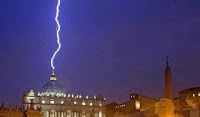 UPDATE 8/29: More from the Cupich interview. Has to be seen to be believed.
UPDATE 8/29: More from the Cupich interview. Has to be seen to be believed. The pattern is by now familiar. Serious criticisms are leveled by serious people against the pope; the pope ignores them; and his associates and defenders disregard the substance of the criticisms while flinging ad hominem attacks at the critics. This happened during the doctrinal controversies over Amoris Laetitiaand capital punishment, and it is happening again in the wake of Archbishop Vigano’s astonishing testimony. The pope refuses to answer the charges against him. The Usual Sycophants try to smear the archbishop and his defenders as disgruntled reactionaries. Among Uncle Ted’s boys, Cardinal Cupich leapt almost immediately for the bottom of the rhetorical barrel: “Quite frankly, they also don’t like [the pope] because he’s a Latino.”This “ignore the message and pillory the messenger” strategy would be contemptible coming from a grubby ward politician. It is, needless to say, utterly unworthy of the Vicar of Christ and his cardinals. But from the point of view of cynical political calculation, it has its advantages. It has, after all, seemed to work so far.
However, I don’t think it will work this time. The conditions that facilitated it before don’t obtain in this case. Large numbers of Catholics hold heterodox views on matters of divorce and marriage and capital punishment, not to mention many other topics. They are quite happy with Amoris, the change to the catechism, and all the other doctrinally problematic statements the pope has made over the last five years. Meanwhile, many orthodox Catholics, well-meaning but naïve, have been willing to put up and shut up as long as they can cobble together some far-fetched interpretation of the problematic statements that seems to preserve continuity with past teaching. Then there are all the Catholics who aren’t even paying attention to these doctrinal controversies in the first place. Under these circumstances, writing off the critics as a minority of cranks can be effective.
The current scandal is very different. Even in the current low state of the Church and society, no one wants to defend predatory perverts and those who cover for them, much less take them on board as close advisors. Nor are there theological nuances here that might seem to provide the guilty a means of finessing the gravity of their offenses. The situation is easily understood, and, given its salaciousness, bound to draw the attention and disapproval even of people who ordinarily take no interest in Church affairs. This isn’t some abstract doctrinal controversy. It’s a question of what the pope and the cardinals closest to him knew about “Uncle Ted” and when they knew it. Under these circumstances, refusing to comment except to smear your accusers only lends plausibility to the accusations.
The pope already found out the hard way in Chile that populism does not cover a multitude of sins. It looks like the lesson may now be repeated on a much larger scale. It may be precisely the people, rather than the theologians, who prove to be the most effective critics of “the people’s pope.” However this all plays out, at this point Pope Francis’s place in history seems assured.
Related posts:
Papal fallibility
Denial flows into the Tiber
The Church permits criticism of popes under certain circumstances
Published on August 28, 2018 23:08
Hubris meets nemesis?
 The pattern is by now familiar. Serious criticisms are leveled by serious people against the pope; the pope ignores them; and his associates and defenders disregard the substance of the criticisms while flinging ad hominem attacks at the critics. This happened during the doctrinal controversies over Amoris Laetitiaand capital punishment, and it is happening again in the wake of Archbishop Vigano’s astonishing testimony. The pope refuses to answer the charges against him. The Usual Sycophants try to smear the archbishop and his defenders as disgruntled reactionaries. Among Uncle Ted’s boys, Cardinal Cupich leapt almost immediately for the bottom of the rhetorical barrel: “Quite frankly, they also don’t like [the pope] because he’s a Latino.” This “ignore the message and pillory the messenger” strategy would be contemptible coming from a grubby ward politician. It is, needless to say, utterly unworthy of the Vicar of Christ and his cardinals. But from the point of view of cynical political calculation, it has its advantages. It has, after all, seemed to work so far.
The pattern is by now familiar. Serious criticisms are leveled by serious people against the pope; the pope ignores them; and his associates and defenders disregard the substance of the criticisms while flinging ad hominem attacks at the critics. This happened during the doctrinal controversies over Amoris Laetitiaand capital punishment, and it is happening again in the wake of Archbishop Vigano’s astonishing testimony. The pope refuses to answer the charges against him. The Usual Sycophants try to smear the archbishop and his defenders as disgruntled reactionaries. Among Uncle Ted’s boys, Cardinal Cupich leapt almost immediately for the bottom of the rhetorical barrel: “Quite frankly, they also don’t like [the pope] because he’s a Latino.” This “ignore the message and pillory the messenger” strategy would be contemptible coming from a grubby ward politician. It is, needless to say, utterly unworthy of the Vicar of Christ and his cardinals. But from the point of view of cynical political calculation, it has its advantages. It has, after all, seemed to work so far. However, I don’t think it will work this time. The conditions that facilitated it before don’t obtain in this case. Large numbers of Catholics hold heterodox views on matters of divorce and marriage and capital punishment, not to mention many other topics. They are quite happy with Amoris, the change to the catechism, and all the other doctrinally problematic statements the pope has made over the last five years. Meanwhile, many orthodox Catholics, well-meaning but naïve, have been willing to put up and shut up as long as they can cobble together some far-fetched interpretation of the problematic statements that seems to preserve continuity with past teaching. Then there are all the Catholics who aren’t even paying attention to these doctrinal controversies in the first place. Under these circumstances, writing off the critics as a minority of cranks can be effective.
The current scandal is very different. Even in the current low state of the Church and society, no one wants to defend predatory perverts and those who cover for them, much less take them on board as close advisors. Nor are there theological nuances here that might seem to provide the guilty a means of finessing the gravity of their offenses. The situation is easily understood, and, given its salaciousness, bound to draw the attention and disapproval even of people who ordinarily take no interest in Church affairs. This isn’t some abstract doctrinal controversy. It’s a question of what the pope and the cardinals closest to him knew about “Uncle Ted” and when they knew it. Under these circumstances, refusing to comment except to smear your accusers only lends plausibility to the accusations.
The pope already found out the hard way in Chile that populism does not cover a multitude of sins. It looks like the lesson may now be repeated on a much larger scale. It may be precisely the people, rather than the theologians, who prove to be the most effective critics of “the people’s pope.” However this all plays out, at this point Pope Francis’s place in history seems assured.
Related posts:
Papal fallibility
Denial flows into the Tiber
The Church permits criticism of popes under certain circumstances
Published on August 28, 2018 23:08
August 20, 2018
The Immateriality of the Mind
 At the Society of Catholic Scientists meeting at Catholic University of America last June, I gave the keynote address on the topic “Arguments for the Immateriality of the Mind.” You can now watch the lecture via YouTube. (For anyone who is wondering, Prof. Karin Öberg, one of the conference organizers, is the one you’ll see introducing me.) Some of the other conference talks can also be seen at the SCS page at YouTube. Links to other recent talks of mine can be found at my main website.
At the Society of Catholic Scientists meeting at Catholic University of America last June, I gave the keynote address on the topic “Arguments for the Immateriality of the Mind.” You can now watch the lecture via YouTube. (For anyone who is wondering, Prof. Karin Öberg, one of the conference organizers, is the one you’ll see introducing me.) Some of the other conference talks can also be seen at the SCS page at YouTube. Links to other recent talks of mine can be found at my main website.
Published on August 20, 2018 16:38
August 18, 2018
Review of Pinker’s Enlightenment Now (Updated)
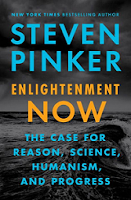 UPDATE: The review has now been unlocked and can be read for free at the CRB website.
UPDATE: The review has now been unlocked and can be read for free at the CRB website.My reviewof Steven Pinker’s Enlightenment Now: The Case for Reason, Science, Humanism, and Progress appears in the Summer 2018 issue of the Claremont Review of Books.Links to other book reviews from CRB and elsewhere can be found at my main website.
Published on August 18, 2018 09:23
Review of Pinker’s Enlightenment Now
 My reviewof Steven Pinker’s
Enlightenment Now: The Case for Reason, Science, Humanism, and Progress
appears in the Summer 2018 issue of the Claremont Review of Books. Links to other book reviews from CRB and elsewhere can be found at my main website.
My reviewof Steven Pinker’s
Enlightenment Now: The Case for Reason, Science, Humanism, and Progress
appears in the Summer 2018 issue of the Claremont Review of Books. Links to other book reviews from CRB and elsewhere can be found at my main website.
Published on August 18, 2018 09:23
August 15, 2018
An Open Appeal to the Cardinals of the Church
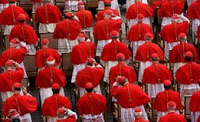 An international group of 45 Catholic scholars and clergy has signed an appeal to the cardinals of the Catholic Church, calling on them to advise Pope Francis to retract the recent revision made to the Catechism, on the grounds that its appearance of contradicting scripture and traditional teaching is causing scandal. The appeal and list of signatories has been published today as an open letter at First Things.
An international group of 45 Catholic scholars and clergy has signed an appeal to the cardinals of the Catholic Church, calling on them to advise Pope Francis to retract the recent revision made to the Catechism, on the grounds that its appearance of contradicting scripture and traditional teaching is causing scandal. The appeal and list of signatories has been published today as an open letter at First Things.As LifeSiteNews is reporting, over 30 further Catholic scholars, clergy, and professionals have also added their signatures to the appeal. This longer list can be viewed there.
Published on August 15, 2018 08:05
Edward Feser's Blog
- Edward Feser's profile
- 331 followers
Edward Feser isn't a Goodreads Author
(yet),
but they
do have a blog,
so here are some recent posts imported from
their feed.



